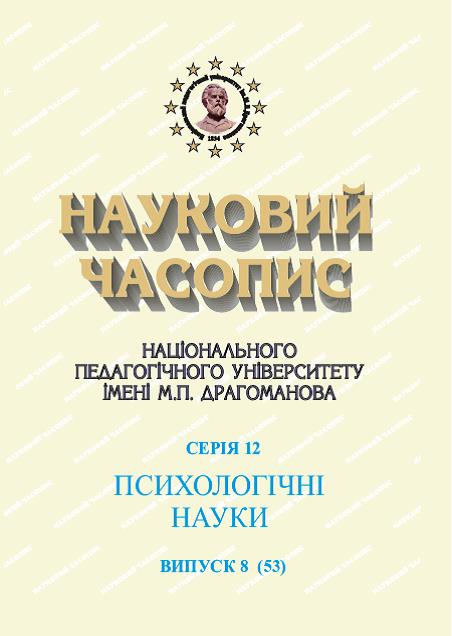SPECIFICS OF BUILDING FEEDBACK IN THE ONLINE COMMUNICATION OF A PSYCHOLOGIST DURING GROUP INTERACTION
DOI:
https://doi.org/10.31392/NPU-nc.series12.2019.8(53).07Keywords:
media competency, communicative media competency, feedback, online communication, media spaceAbstract
The article describes the work of psychologists with clients in the online space. Communication is the basic instrument of the psychologist’s activity. It definitely requires qualitative offline and online interaction. Psychologists conduct group professional online interaction in the form of webinars, workshops, trainings, online conferences, quests and marathons, arrange live broadcasts on YouTube, live broadcasts on Facebook or Instagram. Online Psychological Assistance is a modern alternative source of providing high-quality psychological assistance to clients. However, there is a problem with online feedback building. High level of communicative competency, high level of communicative control, organizational abilities, flexibility of behavior and creative abilities will help the psychologist to build qualitative feedback. Psychologists-practitioners participated in the research (n=62). The chosen method bank has allowed us to estimate the level of development of the abilities that the psychologist-practitioner needs to successfully build feedback during group work in the media space. Using content analysis, we analyzed how psychologists build audience feedback through the example of five webinars, and formed methodical recommendations how to build online group interaction feedback. We also found that, on average, about 20% of those surveyed demonstrated a low level of development of the abilities that practitioner psychologists need to be able to successfully build group client interaction in the online space. About 60% of psychologists have a high level of development of communication and organizational skills. Only 19% of respondents have welldeveloped communication control. 70% of the respondents have an average level of development of flexibility in behavior and creativity. We see prospects for further research in the theoretical and empirical research of the development of communicative and organizational skills, the level of communicative control, flexibility of behavior and creativity of students.
References
- Rubczov, А.V., & Lebedeva, S. (2002). Virtual'naya psikhologicheskaya sluzhba: funktsional'nyye zadachi i osobennosti organizatsii [Virtual psychological service: functional tasks and organization features]. Psikhologicheskaya nauka i obrazovaniye – Psychological science and education, 7(1), 87-97. Retrieved from https://psyjournals.ru/files/2353/psyedu_2002_n1_Rubtsov.pdf [in Russian].
- Solov’eva, O.V. (1992). Obratnaja svjaz’ v mezhlichnostnom obshhenii [Feedback in interpersonal communication]. Moscow : Izd-vo MGU [in Russian].
- Stremousova, E. (2009). Harakter mezhlichnostnyh otnoshenij i jeffektivnost’ obratnoj svjati. [The nature of interpersonal relationships and the effectiveness of feedback]. Mir psihologii – World of psychology, 8(4), 223-235 [in Russian].
- Sharikov, A.V. (1990). Media obrazovanie: mirovoj i otechestvennyj opyt [Media Education: World and Domestic Experience]. Moscow : NII SO i UK APN SSSR [in Russian].
- Riva, G., & Galimberti, C. ( 2004). The Mind in the Web: Psychology in the Internet Age. Cyberpsychology & Behavior, 4(1), 1-5. https://doi.org/10.1089/10949310151088299
- Wallace, (2005) The psychology of the Internet. Maryland : Cambridge University Press.

